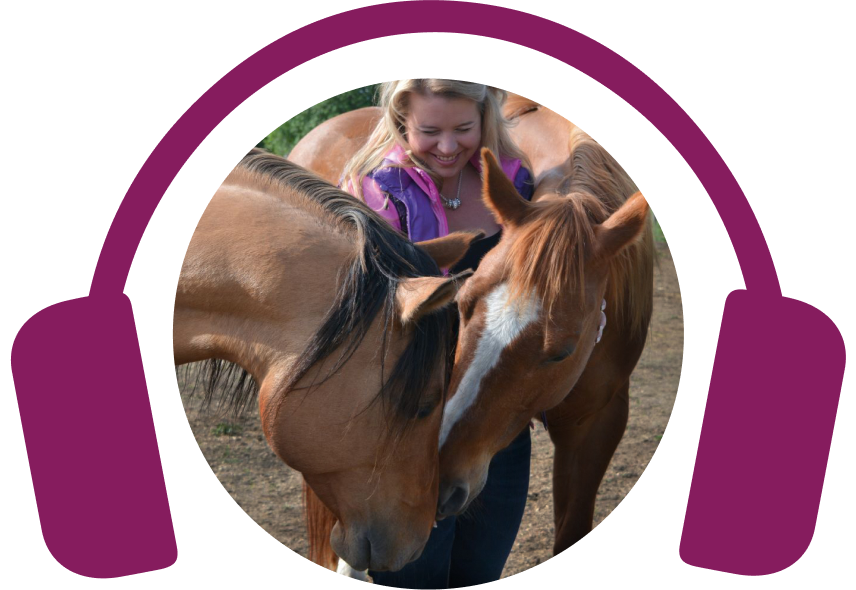Elisha’s Podcast
ELISHA’S PODCAST

Ready to get your horses on the path to better health?
This podcast was created to do just that.
Tune in to get new insights, perspectives, horse health tips, and real-life horse healing stories.
Take what you learn and apply it to your horse TODAY.

One Conversation at a time
From learning what to feed your horse and how to use nutrition effectively, to practicing prevention and approaching specific health challenges naturally, to just bringing your horse more joy and better health…
I’ve got you covered!

Check out my recent episodes
Every year, from late November to early December, we roll up our sleeves, set the dates, map out the plan, and fine-tune the details for the year ahead. Join me today for an exclusive behind-the-scenes look at how we structure the program, what you will learn, the rollout date, and all the incredible benefits you can expect! Overview of the Program This signature program has been a favorite among horse owners and practitioners since it launched in 2018. It has been designed to give you a strong foundation in holistic horse care and is packed with practical, easy-to-understand information to help you make the best choices for a healthy and happy horse. Updated in 2020 with even more resources, it is a hands-on, flexible learning experience perfect for horse lovers at any level. A Supportive Global Community Caring for horses can feel like a solo adventure sometimes, especially if you live in a remote area. This course connects you with a worldwide community of like-minded people who share your passion. You will swap stories, share insights, and learn how horse care challenges are surprisingly universal, no matter where you are. How the Course Works The course spans 12 weeks and includes nine in-depth modules with a few pause weeks to allow you to work through the material at your own pace. Each module builds on the last, with practical exercises you can apply to any horse. A Holistic Mindset The course starts by helping you view horse health from a new perspective. You will learn to look at the history of a horse, spot patterns, and connect the dots between symptoms and underlying issues. It is a whole-horse approach that considers mental, physical, emotional, and even spiritual health, giving you a deep understanding of how the equine body works and reacts to care. Practical Horse Care In modules two and three, we dive into the fundamental aspects of anatomy, physiology, and diet. You will learn how to use food as medicine, tailoring the diet to address imbalances, intolerances, or allergies. By the end, you will know how to customize a feeding plan to meet the unique requirements of your horse. Advanced Tools for Health We also explore therapeutic nutrition, herbs, and homeopathy. You will learn to use vitamins, minerals, and natural remedies to tackle specific health challenges. These modules are all broken down into simple and easy-to-apply, actionable steps. Tackling Common Problems In the later modules, we get into the nitty-gritty of hoof health, toxins, and parasites. You will learn how to spot common hoof issues, like thrush or long toes, and how to address them naturally. You will also learn strategies to minimize exposure to toxins and manage parasites in ways that keep your horse feeling their best. Real-Life Solutions One of the highlights of this course is the final module, which has natural protocols for over 30 specific health issues. When you reach this point, you will have all the tools you need to create a personalized care program for your horse. You will also know how to track your horse's progress and adjust when necessary. Flexible and Easy to Follow The course is structured to fit into your busy life. The materials are released weekly, and there are live classes every Tuesday evening (with recordings if you cannot make it). There is also a private Facebook group where you can get extra support and connect with other participants, and quizzes you can complete along the way, and you will earn a certificate at the end. Ready to Join? If you want to learn about holistic horse care and give your horse the gift of better health, this is the course for you! Join the waitlist on our website or email us at support@elishaedwards.com if you have any questions. Links and resources: Connect with Elisha Edwards on her website Join my email list to be notified about new podcast releases and upcoming webinars. Free Webinar Masterclass: Four Steps to Solving Equine Metabolic Syndrome Naturally Register for my self-paced course, Resolving Equine Metabolic Syndrome Naturally Save your seat in Elisha's 2-hour live workshop Detox Done Right This week, we are continuing with the theme of toxicity because it lies at the root of most health issues horses experience. Looking back at past cases, the pattern is unmistakable. Once you remove those dietary toxins, things start to turn around. The tricky part is knowing what is helpful and what is harmful, so that is what we are focusing on today. Over-Supplemented Over-supplementation becomes a major contributor to malabsorption, inflammation, and chronic health problems. Many ingredients, especially synthetic, inflammatory, or poorly absorbed ones, cause toxicity, overwhelm digestion, and suppress the immune system. Interpreting Ingredient Lists Horse owners must learn to interpret ingredient lists to distinguish food ingredients from vitamins, minerals, preservatives, flavorings, and fillers. Many supplements contain a few beneficial components surrounded by ingredients that negate their benefits. So it is essential to know which are organic, which are inorganic, and which are highly processed. Detoxifying Means Removing, Not Adding Detoxification comes from removing substances rather than adding more. Every ingredient requires a digestive resource, and when the system is congested, even beneficial nutrients turn toxic. Removing non-essential supplements frees the liver, gut, and cells to function normally, improves absorption, and reduces inflammation. A temporary reset with hay, water, and salt will allow the digestive system to heal. The Fear of Stopping Supplements Many owners fear that their horses will regress if they remove their supplements, yet many horses decline because they cannot properly absorb the supplements they get. Most commercial ingredients are so processed and inorganic that the body barely recognizes them. Simplifying is not deprivation. It restores capacity. Nutrition from forage and whole foods becomes far more effective with reduced digestive stress. Why Simplifying Works Turnarounds can happen when owners strip everything back to only a few essential nutrients plus detoxifying herbs. Even horses on high-quality programs with good ingredients can improve dramatically by reducing their overall load. Fewer ingredients reduce competition for receptors, lowering inflammation and improving the absorption of fat-soluble nutrients and minerals. Ingredient Competition Inflammatory ingredients block the absorption of critical minerals, fat-soluble vitamins, and proteins. Even high-quality formulas can fail if too many ingredients compete for absorption. Less is often more because simplified diets reduce receptor blockage, increase bioavailability, and allow the body to use what it gets. Choosing Supplements Labels market conditions like ulcers, metabolic syndrome, and digestion, without guaranteeing ingredient suitability. Horses with ulcers, for example, cannot absorb synthetic nutrients well, especially while on proton pump inhibitors. So owners must evaluate what each ingredient actually does rather than trusting marketing claims. A Three-Step Supplement Audit Auditing provides clarity and helps you decide what to remove, what to keep, and what genuinely benefits the horse. Do you know what exactly is in your horse's supplements, and what they're actually doing for their health? Keeping your horse's diet and supplement program clean is one of the most beneficial things you can do for them. There is nothing that turns a horse's health around faster than cleaning up their diet and supporting their health from the inside out. The good news is I'm going live on Saturday, December 6, 2025, at 10 am Mountain Standard Time, and I invite you to join me for my first-ever two-hour workshop called Detox Done Right: How To Reduce Your Horse's Toxic Load and Upgrade Their Health. For just $127 Canadian, you will get my hands on my label-reading playbook and my clean feed roadmap- and we will finish with a 30-minute Q&A to help turn your supplement confusion into clarity. If you care about your horse's health and want real, practical steps that lead to results, then this workshop is just for you! Save your seat by clicking on the link in the show notes, or head over to my website. No need to worry if you register and miss it because I will have a recording waiting for you, whenever you are ready- but I do hope to see you all there, live! Links and resources: Connect with Elisha Edwards on her website Join my email list to be notified about new podcast releases and upcoming webinars. Free Webinar Masterclass: Four Steps to Solving Equine Metabolic Syndrome Naturally Register for my self-paced course, Resolving Equine Metabolic Syndrome Naturally. Save your seat in Elisha's 2-hour live workshop Detox Done Right. Much of what we read online about horse health is misleading. So, for those of you following a more natural and holistic path by focusing on the diet, lifestyle, and environment of your horses before turning to drugs or surgery, having the correct understanding is essential. I hope that each episode helps you view conditions like insulin resistance, equine metabolic syndrome, and laminitis with clearer eyes and more confidence. Today, we are exploring insulin, what happens when it stays high for too long, why it becomes toxic in the body, and how this links to metabolic dysfunction, chronic inflammation, and the early stages of laminitis. Insulin Can Become Toxic When insulin remains elevated for too long, it starts to act like a toxin. It constricts blood vessels, increases inflammation, damages cells, and impairs nutrient delivery, especially to their highly sensitive hooves. Inflammation and Insulin Feed Each Other High insulin drives inflammation. Inflammation drives insulin levels even higher, damaging tissues, reducing circulation, and increasing the likelihood of laminitis. Breaking this cycle requires addressing both inflammation and insulin simultaneously. The Role of Nutrition and Detox Supporting your horse with proper nutrition and removing toxins is essential. Antioxidants, clean feed, and reducing chemical exposures will help the body repair damaged cells, restore balance, and bring insulin levels back into a healthy range. Hoof Health Depends on Circulation Hoof care and internal health must go hand in hand. Restricted blood flow in the hooves worsens laminitis and founder. Proper trimming, padding, booting, and movement are all critical, along with dietary and metabolic support. The Whole Body Matters If symptoms are visible in the feet, the rest of the body will be affected as well. Supporting liver function, reducing stressors, and regenerating cells throughout the body improves overall health and helps prevent further complications. Do you know what exactly is in your horse's supplements, and what they're actually doing for their health? Keeping your horse's diet and supplement program clean is one of the most beneficial things you can do for them. There is nothing that turns a horse's health around faster than cleaning up their diet and supporting their health from the inside out. The good news is I'm going live on Saturday, December 6, 2025, at 10 am Mountain Standard Time, and I invite you to join me for my first-ever two-hour workshop called Detox Done Right: How To Reduce Your Horse's Toxic Load and Upgrade Their Health. For just $127 Canadian, you will get my hands on my label-reading playbook and my clean feed roadmap- and we will finish with a 30-minute Q&A to help turn your supplement confusion into clarity. If you care about your horse's health and want real, practical steps that lead to results, then this workshop is just for you! Save your seat by clicking on the link in the show notes, or head over to my website. No need to worry if you register and miss it because I will have a recording waiting for you, whenever you are ready- but I do hope to see you all there, live! Links and resources: Connect with Elisha Edwards on her website Join my email list to be notified about new podcast releases and upcoming webinars. Free Webinar Masterclass: Four Steps to Solving Equine Metabolic Syndrome Naturally Register for my self-paced course, Resolving Equine Metabolic Syndrome Naturally.
Meet your host
Hi there, I’m Elisha Edwards

Meet your host
Hi there, I’m Elisha Edwards
I have helped guide thousands of horses back to good health over the years from a variety of different health challenges. And through my courses, webinars, and speaking engagements I educate and empower horse owner’s from around the world to take charge of their horse’s health using the holistic model of health care.
So I know first-hand how difficult and overwhelming it can be to navigate all the different opinions and conflicting information that you come across especially when your horse is faced with a health problem. In many cases, the journey is just as hard on the owners as it is on the horses.
I started Healing Horses with Elisha to guide you, support you, and encourage you through the process of prevention and recovery so you feel good about the decisions you’re making for them.
Here’s what I believe
I have seen countless horses with seemingly impossible health conditions that have been resolved so easily with the right combination of diet, nutrition, and natural remedies. In many cases, it is not the health conditions that prevents the horse from recovering, it is the lack of education, resources, and options that are available.
If the insight and information you gain from this podcast gives you some newfound hope or inspires you to take
a new approach then it has served it’s purpose.
Thank you for giving me the opportunity to help you improve your horse’s health.
Keep listening and learning. Your horse is worth it.
Listen Now
Tune in wherever you listen to your podcasts and follow me so you never miss an episode. I release a new one every Tuesday!

Leave a Review
Reviews help me reach more horses and also help me deliver more relevant content to you!

What my Listeners are saying
“Every time I think there is no way to top what you do – you elevate us to yet another level. I wish I had a fraction of your communication skills. You’re amazing and I am so grateful to be apart of the magic you are creating for horses and their humans.”
Tracey
“Your podcasts are fantastic! I get so excited to listen to the next one. I have 6 geriatric horses and your podcast has really opened my mind to new possibilities in their health and given me the strength to help them through hiccups in their well-being the past few months. I have a nursing education and you explain pathology better than my university professors.”
Sharon
“I can’t thank you enough for the Mindset Tips podcast. I really needed this reminder. It was just what I needed to hear to today.”



